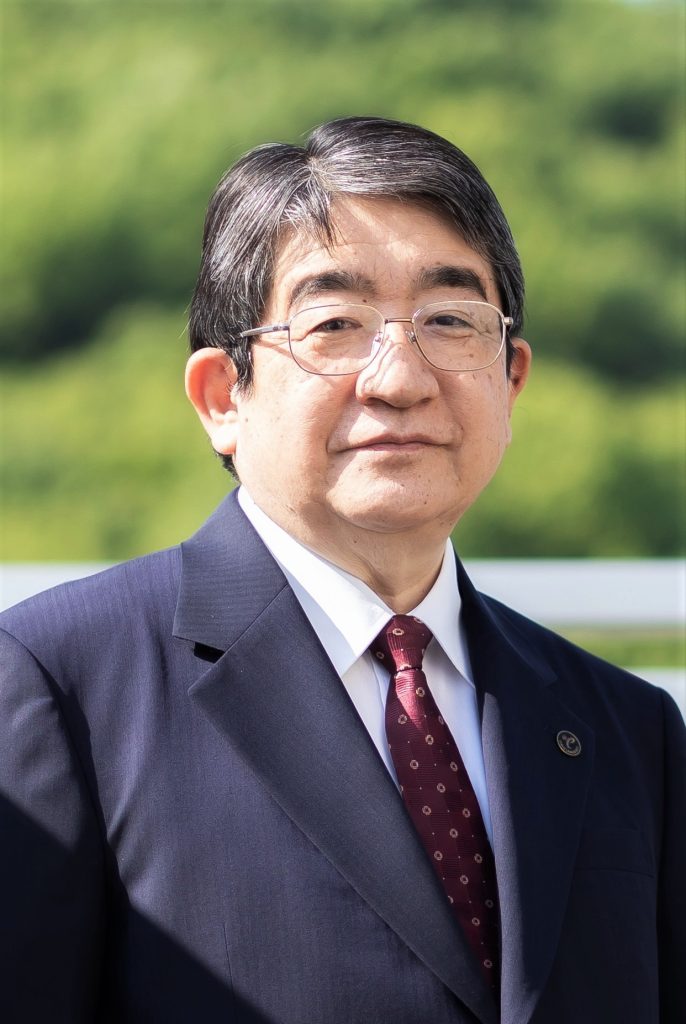Introduction of the president
Message
There have been 19 years since national universities became independent administrative corporations in 2004. And in 2022 Ehime University has entered its 4th Mid-term Target Period. During this period we will continue to develop various activities based on the vision of “taking the initiative in the region in implementing educational, research and social activities contributing to society from a global perspective” . Organizationally we will fulfill the role of a regional university; with seven faculties responsible for education and research in their respective academic fields, and four organizations (the Institute for Education and Student Support, the Institute for the Promotion of Science and Technology, the Institute for Collaborative Relations, and the Institute for International Relations) responsible for functions as a university in the region.
Today, in addition to the medium- and long-term issues of population decline due to declining birthrates and worsening global environmental problems, we are faced with essential and serious problems such as frequent and increasingly severe natural disasters, and COVID 19. The invasion of Ukraine by Russia has made people angry that such a thing could happen in the 21st century, and “values that the world should be able to share,” such as peace, human rights, and democracy, are being lost. From here on, humanity needs to urgently work towards “sustainable societies” and “resilient communities. To achieve this, we need to address the SDGs, DX (Digital Transformation), carbon neutrality, and gender equality.
In the field of education, we have reaffirmed that “students will continue to live for the next 60 years.” To this end, we want students to acquire the “ability to live as independent individuals” who can flexibly respond to the new social system, and design and implement their own way of life and work, the “ability to protect themselves from various disasters”, the “ability to imagine the near future through scientific knowledge and logical thinking” and the “ability to talk about one’s visions to others”.
In terms of research, it is necessary to promote cutting-edge academic research based on a wide and diverse range. As a regional national university it is furthermore essential to implement the results of such research in society and make connections for innovation in local industries.
As a national university based in the region, Ehime University is required to contribute to regional development in addition to make ground for talented young graduates and promoting academics. Ehime University contributes to regional revitalization and fulfills its function as a “center of knowledge” in the region through a variety of initiatives. This includes participation in regional industrial innovation; contributing to recurrent and retraining education for professionals and the diversification of work styles, such as remote work; creation of new industries through the utilization of intellectual property and industry-academia-government-finance-private partnerships; and reevaluation and dissemination of regional culture. The development of human resources to promote DX in the region and local industries is another pressing issue that we must address. In addition, as we are developing into a post-corona society, student and research exchanges with other countries are returning.
It has been argued that the reason of being for a university is to follow changes in society and take the lead to show values and indicate a future for society.” Due to a declining birthrate the population and society will certainly shrink. We thus will need to transform our society in a manner that despite this downsizing we can feel happiness.
My basic policy is to contribute to the construction of sustainable and resilient societies by promoting the multi-functionality of our university as a “center of knowledge in the region” for all generations through organizational diversity. In April 2022, we established a university-wide organization for comprehensive strategies to sensitively recognize social changes and stakeholder expectations to take necessary measures as a university in a timely manner. Furthermore, there is a need to strengthen management capabilities through intellectual property and implementation in society of research results.
I sincerely hope that you will continue to support Ehime University and our various initiatives.
NISHINA Hiroshige
President
Ehime University
Profile
| Year of Birth | 1954 |
| Degree | Doctor of Agriculture |
| Career Summary |
April 1998 Professor, Faculty of Agriculture, Ehime University |
| Areas of Specialization | Agricultural Engineering, Plant Factory |


